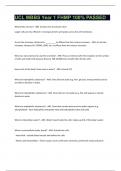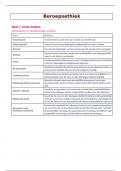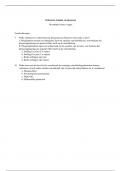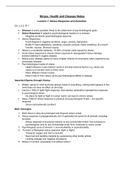What limits cell size? - ANS Surface area to volume ratio!
Larger cells are less efficient in moving nutrients and waste across the cell membrane.
As cell size increases, distance for _________ to diffuse from the nucleus increases. - ANS As cell size
increases, distance for TOXINS, IONS, etc. to diffuse from the nucleus increases.
What can nano-devices be used for and why? - ANS They can interact with the receptors on the surface
of cells and inside cells because they are 100-10,000 times smaller than human cells.
How much of the body's lean mass is water? - ANS Around 2/3
What are hydrophilic substances? - ANS Ones that are polar (e.g. Na+, glucose, many proteins) and so
are able to dissolve in water
What are hydrophobic substances? - ANS Ones that are non-polar (e.g. fats and waxes) so cannot
dissolve in water
What are amphiphilic substances? - ANS Ones that contain polar and non-polar regions (e.g.
phospholipids - have hydrophilic phosphate head and hydrophobic fatty acid tails)
What is intracellular water? - ANS Water found inside the cells: makes up 2/3 of the body's water.
Where is extracellular water found? - ANS Outside the cells:
- Interstitial - outside blood vessels and bathes the cells
- Plasma and transcellular - fluid in spaces such as the brain ventricles, peritoneal cavity and joints
,What is the purpose of the plasma membrane? - ANS Provides a hydrophobic barrier separating
intracellular and extracellular components
What sorts of molecules can freely pass the plasma membrane? - ANS Lipid-soluble molecules, because
they dissolve in the phospholipid membrane.
What is osmotic pressure? - ANS MRT (molarity x gas constant x temperature)
plays an important role in transport of molecules across membranes
depends on the number of particles present per unit volume of solvent (NOT CHEMICAL MAKE-UP)
What effect do salts have on osmotic pressure? - ANS Exert double osmotic pressure as they have two
constituent ions
Define osmolarity - ANS The number of moles of solute particles per LITRE of solution (preferred by
scientists)
Define osmolality - ANS The number of moles of solute per KILOGRAM of solution (preferred by
clinicians)
What is the value of blood plasma osmolality? - ANS precisely 295 mOsmol/kg
(around 300mOsmol/kg)
What makes up blood plasma osmolality? - ANS Majority is Na+, Cl- and HCO3-
Glucose contributes around 10 mOsmol/kg
Plasma proteins contribute the least (around 1 mOsmol/kg)
,What is meant by isosmotic? - ANS Two solutions have the same osmolality.
Why is intracellular and extracellular fluid normally isosmotic? - ANS Under normal conditions, the
volume of cells is constant so intracellular fluid has the same osmolality as extracellular fluid.
Fluids which are isotonic are always __________ but the reverse isn't necessarily true - ANS Fluids
which are isotonic are always ISOSMOTIC but the reverse isn't necessarily true
What type of cells constantly have to cope with the osmotic phenomenon? - ANS Erythrocytes (RBCs)
What is used to dilute blood and why? - ANS 0.9% NaCl solution (rather than pure water) to ensure that
cells do not lyse or crenate.
What is meant by crenation? - ANS Water leaves the RBC by osmosis, so it shrinks and shrivels up.
What happens to cells placed in hypotonic solutions? - ANS The solution is more dilute, so they
lyse/burst.
What happens to cells placed in hypertonic solutions? - ANS The solution is more concentrated so the
cells crenate.
What is meant by tonicity? - ANS A relative measure of the osmotic pressure of two solutions on either
side of a semi-permeable membrane.
How does homeostasis enable higher organisms to survive in and inhabit a range of conditions? - ANS
Because, unlike unicellular organisms, they aren't forced to only live in places where conditions are
correct for that cell as they have greater control over their body.
, What in humans helps maintain homeostasis? - ANS The extracellular fluid (extracellular environment is
a fluid environment)
Define homeostasis. - ANS The maintenance of a constant internal environment within narrow limits in
a wide variety of external environments or conditions.
What does the stability of the extracellular environment enable? - ANS Chemical reactions can occur
under optimal conditions.
What are normal internal conditions? - ANS [Na+] = 145mM
[K+] = 4mM
temperature = 37.1ºC
pH = 7.4
Briefly describe the homeostatic control mechanism. - ANS - Uses a stimulus and response system
- Detects errors/variations and then counteracts these to restore values to within a normal range
- Uses homeostatic feedback loops
What are the four components of a homeostatic feedback loop? - ANS variable; sensor; integrating
centre; effector
What is a variable in homeostasis? - ANS An element of the internal environment that is sought to be
controlled, for which there is a set-point (normal value)
What usually functions as a sensor? - ANS A receptor or channel that allows cells to recognise that a
change in the variable has occurred.











